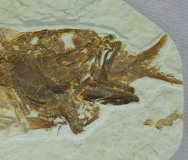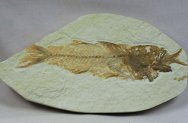Mioplosus
labracoides
Class Actinopterygii,
Order Perciformes, Family Percidae
Knightia
eocaena
Class Actinopterygii,
Order Clupeifomes; Family Clupeidae
Geological
Time: Eocene
Size: Fish
fossil Overall: 131 mm Mioplosus: 120 mm in length on a 147 mm by 80 mm
matrix
Fossil
Site: Split Fish Layer, Green River Formation, Fossil Lake, Kemmerer,
Wyoming
Code: WFF162
Price: Sold
 Description:
This 50 million year old, Eocene-Era fossil fish comes from one
of the world's famous Laggerstatte, the Green River Formation in
Wyoming. A small portion of the fish fossils from Green River exhibits
such fine preservation. The significant extent of soft-tissue preservation
that makes the site famous is evident in this specimen. The rich
brown color shows this one comes from the famous Split Fish Layer,
a name derived from the fact that the deposits from which these
excellent specimens are quarried tends to split along the axis in
which the fossil is found. These beds can be several meters in thickness
as contrasted with the 18 Inch Layer whose name is indicative of
the total thickness of this deposit. Description:
This 50 million year old, Eocene-Era fossil fish comes from one
of the world's famous Laggerstatte, the Green River Formation in
Wyoming. A small portion of the fish fossils from Green River exhibits
such fine preservation. The significant extent of soft-tissue preservation
that makes the site famous is evident in this specimen. The rich
brown color shows this one comes from the famous Split Fish Layer,
a name derived from the fact that the deposits from which these
excellent specimens are quarried tends to split along the axis in
which the fossil is found. These beds can be several meters in thickness
as contrasted with the 18 Inch Layer whose name is indicative of
the total thickness of this deposit.
This
one is known as an “aspiration”, a name given such specimens
in that the fish died while choking on its prey, here a small Knightia.
A few specimens such as this are found each year, and are highly
prized by collectors. I was fortunate to acquire this one and one
other at this year’s Tucson fossil show.
Mioplosus
labracoides is believed to have been a voracious predator among
the Green River fish fossils. Failure to find its numbers in mass
mortality leads to further conjecture that it was a solitary hunter.
A member of the Family Percidae, it has numerous relatives in Northern
Hemisphere fresh water as well as fossil relatives in Asia, Europe
and New Zealand. It is known as a predatory species as determined
from its many pointed teeth, and the fact that several have been
found with fish lodged in its throat, just as this one. It may be
related to the modern-day pike of the genus Stezostedion.
|
|


